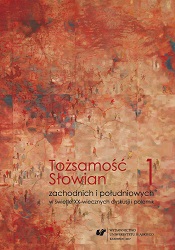Tożsamość narodowa Josipa Broza Tity
The identity of Josip Broz Tito
Author(s): Piotr Żurek
Subject(s): Language and Literature Studies, Studies of Literature, Theory of Literature
Published by: Wydawnictwo Uniwersytetu Śląskiego
Keywords: Josip Broz Tito; Yugoslavia; the Kozje-Bizeljsko dialect; national identity
Summary/Abstract: Tito’s biographies are replete with unbelievable theories regarding his identity and parentage. Obviously, most of them are based on unverified conjectures and mythomaniacalmystifications instead of historical evidence. Even then, rumors and often mendacious gossip spread by the political enemies of the Yugoslav president proved – more or less – successful, having weakened his political image. According to Jože Pirjevec, the success of many later mystifications was based on a statement made by Draža Mihailović after his meeting with Tito in 1941, as the Serbian general believed Tito to be a Russian. This very opinion influenced a group of NSA experts analyzing the language of Tito’s speeches in 1977. They concluded that “Serbo-Croatian” could not be the native language of Tito, as he made mistakes which are typical of a Pole or a Russian. The theory was debunked by Marko Snoj, a linguist from the Slovenian Academy of Sciences and Arts. According to him, what NSA specialist assumed to be Tito’s ineptitude in Serbo-Croatian were vestiges of the Kozjansko-Bizeljski dialect Tito had preserved from his childhood. As a matter of fact, JBT identified himself as a Croatian or a Yugoslav. Serbian historian Olivera Milosavljević argues that in the case of “Yugoslav” one should understand his “state” identity rather than a “national” one. Such statements were forced by the complex national situation of Yugoslavia, as Tito, claiming to be a Croatian, risked displeasure from the Serbian part of the populace. Still, as his speech confirms, he had every right to do it, having grown up at the Croatian-Slovenian borderland in Kumrovec.
- Page Range: 327-341
- Page Count: 15
- Publication Year: 2017
- Language: Polish
- Content File-PDF

